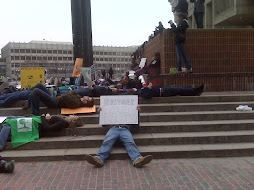Jen Ackerman
Nina Perez
April 14, 2010
Eco-Feminism Blog
The Village Self Destructs
Night Shyamalan’s 2004 thriller The Village is about a village that dwells in the center of the Covington Woods. This village, created by six men and women who wanted to shelter their loved ones from the dangers and greed of the modern world, lives in fear of “those we do not speak of” the monsters who live in the woods. The story’s protagonist is Ivy Walker, who not only blind, but also a women, is the only person willing to travel into these woods to get medicine for her lover. Though she has what many consider a disability, Ivy walker defeats nature in the nature versus human voyage at the climax of the film. This film shapes nature into something to be feared and is used by the elders to keep their people in line and by the end it is clear that Ivy’s disability is what saved her and her village.
This film is nothing if not a complete example of the Medea Theory. Adam Frank defines this as “Life is its own worst enemy” (Frank). The entire point of this movie is that the modern world had turned so ugly and vile that this group of people decided to create their own world. Society had gotten so bad in these men and women’s eyes that they needed to purchase acres of land, fence it in, hire guards to protect it, build some woods, build a village, and then keep up with the farce of “those we do not speak of.” At the end of the movie the character Noah Percy, a mentally disable boy, gets killed, but only because of the lies that the elders spun. The exact act of horror that prompted the elders to create this world, is what ended up happening even in their protected village. They can not escape humans and human nature, we cannot escape ourselves. We are our worst enemy (Perez 4/14).
The main character Ivy is the only willing person to venture into the woods to retrieve medicine for her lover that had been stabbed, another reality the village had never seen. Ivy goes off into the woods with two male chaperons, both of which leave her out of fear. Ivy then continues her mission and eventually returns to the village with the medicine. A female, alone, and blind in the woods is the only truly respectable character we are given in this movie. Right before leaving her in the middle of nowhere one of the men with her says “you are better in these woods than most boys, anyone would say so” (The Village). Just as good as a man is his parting confidence as he, the man, retires in fear. Within this plot we are offered a strong, able, woman. A women who we are to believe has been blind her whole life, uses her remaining senses skillfully and forcefully to get herself home alive.
Although Ivy is shown as a strong woman, she is also brimming with stereotypes. However, I consider these stereotypes secondary to what a positive model she presents. Besides this movie featuring a strong woman as their main character (a strong woman acting to please her man), this movie pits people against nature. The woods are seen as the enemies territory and it is what keeps everyone in place. They are not to enter it and if they do monsters will appear. When Ivy is in route for the medicine, the film again pits her against nature. She has to survive and since we love happy endings, she does.
Works Cited
Frank, Adam. "Is Life Bad News For Planets? The Medea Hypothesis." Web log post. NPR. 21 Feb. 2010. Web. 13 Apr. 2010.
.
Perez, Nina. "Girl Studies." University of Central Florida, Orlando. 14 Apr. 2010. Lecture.
The Village. Dir. M. Night Shyamalan. Perf. Bryce Dallas Howard and Adrien Brody. Touchstone Productions, 2004. DVD.

